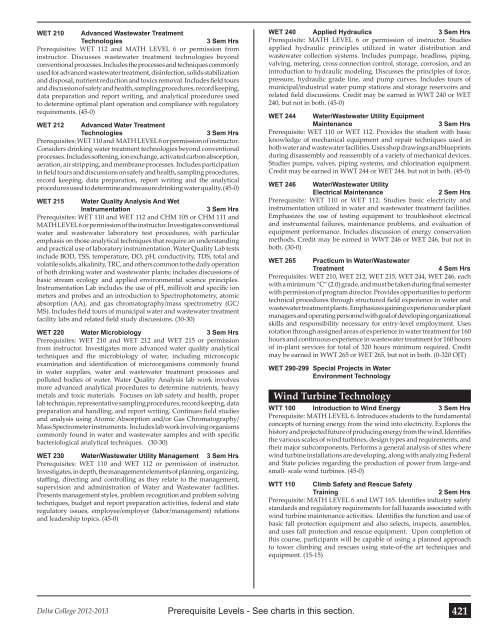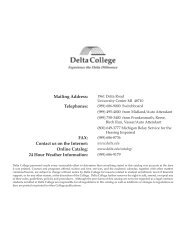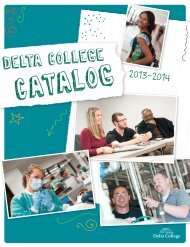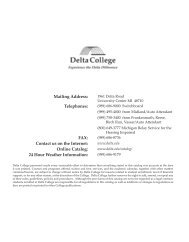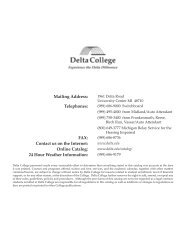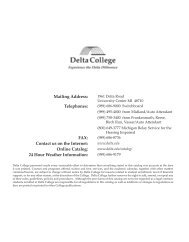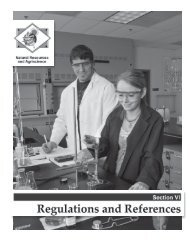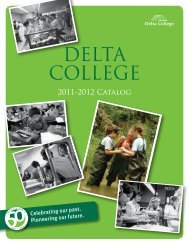2012 - 2013 catalog - Delta College
2012 - 2013 catalog - Delta College
2012 - 2013 catalog - Delta College
You also want an ePaper? Increase the reach of your titles
YUMPU automatically turns print PDFs into web optimized ePapers that Google loves.
WET 210 Advanced Wastewater Treatment<br />
Technologies<br />
3 Sem Hrs<br />
Prerequisites: WET 112 and MATH LEVEL 6 or permission from<br />
instructor. Discusses wastewater treatment technologies beyond<br />
conventional processes. Includes the processes and techniques commonly<br />
used for advanced wastewater treatment, disinfection, solids stabilization<br />
and disposal, nutrient reduction and toxics removal. Includes field tours<br />
and discussion of safety and health, sampling procedures, record keeping,<br />
data preparation and report writing, and analytical procedures used<br />
to determine optimal plant operation and compliance with regulatory<br />
requirements. (45-0)<br />
WET 212 Advanced Water Treatment<br />
Technologies<br />
3 Sem Hrs<br />
Prerequisites: WET 110 and MATH LEVEL 6 or permission of instructor.<br />
Considers drinking water treatment technologies beyond conventional<br />
processes. Includes softening, ion exchange, activated carbon absorption,<br />
aeration, air stripping, and membrane processes. Includes participation<br />
in field tours and discussions on safety and health, sampling procedures,<br />
record keeping, data preparation, report writing and the analytical<br />
procedures used to determine and measure drinking water quality. (45-0)<br />
WET 215 Water Quality Analysis And Wet<br />
Instrumentation<br />
3 Sem Hrs<br />
Prerequisites: WET 110 and WET 112 and CHM 105 or CHM 111 and<br />
MATH LEVEL 6 or permission of the instructor. Investigates conventional<br />
water and wastewater laboratory test procedures, with particular<br />
emphasis on those analytical techniques that require an understanding<br />
and practical use of laboratory instrumentation. Water Quality Lab tests<br />
include BOD, TSS, temperature, DO, pH, conductivity, TDS, total and<br />
volatile solids, alkalinity, TRC, and others common to the daily operation<br />
of both drinking water and wastewater plants; includes discussions of<br />
basic stream ecology and applied environmental science principles.<br />
Instrumentation Lab includes the use of pH, millivolt and specific ion<br />
meters and probes and an introduction to Spectrophotometry, atomic<br />
absorption (AA), and gas chromatography/mass spectrometry (GC/<br />
MS). Includes field tours of municipal water and wastewater treatment<br />
facility labs and related field study discussions. (30-30)<br />
WET 220 Water Microbiology 3 Sem Hrs<br />
Prerequisites: WET 210 and WET 212 and WET 215 or permission<br />
from instructor. Investigates more advanced water quality analytical<br />
techniques and the microbiology of water, including microscopic<br />
examination and identification of microorganisms commonly found<br />
in water supplies, water and wastewater treatment processes and<br />
polluted bodies of water. Water Quality Analysis lab work involves<br />
more advanced analytical procedures to determine nutrients, heavy<br />
metals and toxic materials. Focuses on lab safety and health, proper<br />
lab technique, representative sampling procedures, record keeping, data<br />
preparation and handling, and report writing. Continues field studies<br />
and analysis using Atomic Absorption and/or Gas Chromatography/<br />
Mass Spectrometer instruments. Includes lab work involving organisms<br />
commonly found in water and wastewater samples and with specific<br />
bacteriological analytical techniques. (30-30)<br />
WET 230 Water/Wastewater Utility Management 3 Sem Hrs<br />
Prerequisites: WET 110 and WET 112 or permission of instructor.<br />
Investigates, in depth, the management elements of planning, organizing,<br />
staffing, directing and controlling as they relate to the management,<br />
supervision and administration of Water and Wastewater facilities.<br />
Presents management styles, problem recognition and problem solving<br />
techniques, budget and report preparation activities, federal and state<br />
regulatory issues, employee/employer (labor/management) relations<br />
and leadership topics. (45-0)<br />
WET 240 Applied Hydraulics 3 Sem Hrs<br />
Prerequisite: MATH LEVEL 6 or permission of instructor. Studies<br />
applied hydraulic principles utilized in water distribution and<br />
wastewater collection systems. Includes pumpage, headloss, piping,<br />
valving, metering, cross connection control, storage, corrosion, and an<br />
introduction to hydraulic modeling. Discusses the principles of force,<br />
pressure, hydraulic grade line, and pump curves. Includes tours of<br />
municipal/industrial water pump stations and storage reservoirs and<br />
related field discussions. Credit may be earned in WWT 240 or WET<br />
240, but not in both. (45-0)<br />
WET 244 Water/Wastewater Utility Equipment<br />
Maintenance<br />
3 Sem Hrs<br />
Prerequisite: WET 110 or WET 112. Provides the student with basic<br />
knowledge of mechanical equipment and repair techniques used in<br />
both water and wastewater facilities. Uses shop drawings and blueprints<br />
during disassembly and reassembly of a variety of mechanical devices.<br />
Studies pumps, valves, piping systems, and chlorination equipment.<br />
Credit may be earned in WWT 244 or WET 244. but not in both. (45-0)<br />
WET 246 Water/Wastewater Utility<br />
Electrical Maintenance<br />
2 Sem Hrs<br />
Prerequisite: WET 110 or WET 112. Studies basic electricity and<br />
instrumentation utilized in water and wastewater treatment facilities.<br />
Emphasizes the use of testing equipment to troubleshoot electrical<br />
and instrumental failures, maintenance problems, and evaluation of<br />
equipment performance. Includes discussion of energy conservation<br />
methods. Credit may be earned in WWT 246 or WET 246, but not in<br />
both. (30-0)<br />
WET 265 Practicum In Water/Wastewater<br />
Treatment<br />
4 Sem Hrs<br />
Prerequisites: WET 210, WET 212, WET 215, WET 244, WET 246, each<br />
with a minimum “C”(2.0) grade, and must be taken during final semester<br />
with permission of program director. Provides opportunities to perform<br />
technical procedures through structured field experience in water and<br />
wastewater treatment plants. Emphasizes gaining experience under plant<br />
managers and operating personnel with goal of developing organizational<br />
skills and responsibility necessary for entry-level employment. Uses<br />
rotation through assigned areas of experience in water treatment for 160<br />
hours and continuous experience in wastewater treatment for 160 hours<br />
of in-plant services for total of 320 hours minimum required. Credit<br />
may be earned in WWT 265 or WET 265, but not in both. (0-320 OJT)<br />
WET 290-299 Special Projects in Water<br />
Environment Technology<br />
Wind Turbine Technology<br />
WTT 100 Introduction to Wind Energy 3 Sem Hrs<br />
Prerequisite: MATH LEVEL 6. Introduces students to the fundamental<br />
concepts of turning energy from the wind into electricity. Explores the<br />
history and projected future of producing energy from the wind. Identifies<br />
the various scales of wind turbines, design types and requirements, and<br />
their major subcomponents. Performs a general analysis of sites where<br />
wind turbine installations are developing, along with analyzing Federal<br />
and State policies regarding the production of power from large-and<br />
small- scale wind turbines. (45-0)<br />
WTT 110 Climb Safety and Rescue Safety<br />
Training<br />
2 Sem Hrs<br />
Prerequisite: MATH LEVEL 6 and LWT 165. Identifies industry safety<br />
standards and regulatory requirements for fall hazards associated with<br />
wind turbine maintenance activities. Identifies the function and use of<br />
basic fall protection equipment and also selects, inspects, assembles,<br />
and uses fall protection and rescue equipment. Upon completion of<br />
this course, participants will be capable of using a planned approach<br />
to tower climbing and rescues using state-of-the art techniques and<br />
equipment. (15-15)<br />
<strong>Delta</strong> <strong>College</strong> <strong>2012</strong>-<strong>2013</strong><br />
Prerequisite Levels - See charts in this section.<br />
421


